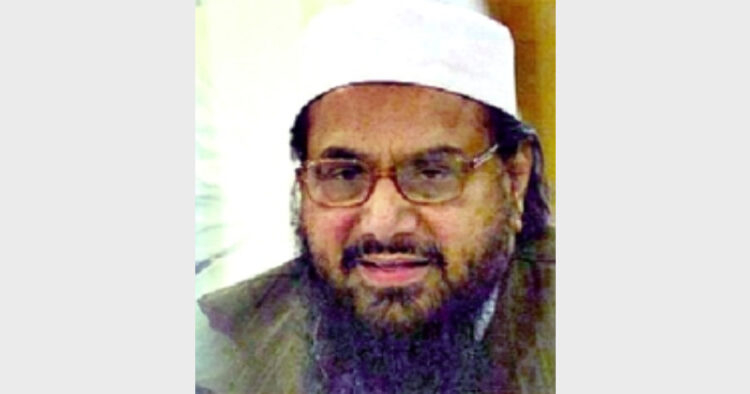Intro: We still do not know who send Mr Vaidik, whom he represents, what the purpose of his meeting (with Saeed) was and who on the Pakistan side sanctioned it.
When journalists differ among themselves on a particular issue, there seems to be hell to pay. Take the case of Ved Pratap Vaidik. He may not be working for any paper right now, but he was an established journalist in the past as his curriculum vitae indicates and besides, he now chairs an organisation called Council For Indian Policy, which supposedly handles
issues relating to international peace. He was apparently invited to Pakistan for talks with Hafiz Saeed. As of now it is not clear whether he was, on his own, seeking a meeting with Saeed or whether he was chosen either by the Pakistan Army or the ISI to hold talks with Saeed.
Saeed, as is well known has been intimately connected with terrorist organisations and there is a price on his head to the tune of USD 10 million. For any Indian, therefore, to wish to interview him raises all sorts of grievances. Saeed has been respo nsible for the deaths of hundreds of Indians. Is it, then, patriotic or proper for anyone, leave alone Vaidik to seek an interview with him? Wouldn’t it be very unpatriotic and an insult to the memory of those Indians who have been killed even to have a cup of tea with Saeed? Here views differ.
nsible for the deaths of hundreds of Indians. Is it, then, patriotic or proper for anyone, leave alone Vaidik to seek an interview with him? Wouldn’t it be very unpatriotic and an insult to the memory of those Indians who have been killed even to have a cup of tea with Saeed? Here views differ.
Worse, Vaidik says he went to see Saeed all on his own and not on behalf of anybody. But if one were Saeed. would one give one’s time to a person who represents nobody but himself? For Saeed to give time to Vaidik he must have known that the latter is worth being given the time. Was Vaidik, then, a conduit between certain important forces in India and equally important forces in Pakistan? Nobody knows and Vaidik doesn’t tell. So then we have two schools of thought on this vital issue. One school holds in the words of Dileep Padgaonkar, writing in The Times of India (July 18) that as “a journalist” Vaidik “is well within his rights to interview Saeed without seeking a nod from anyone”.
Writing in The Indian Express (July 20 ), its editor Prabhu Chawla has some strong views on Track II diplomacy. Accordingn to him “Vaidik may be justified in meeting Saeed as a former media maven, but it is undeniably inappropriate for him to make out a case for Jammu & Kashmir as an independent country.” His advice to Modi is that he must “find formula to dismantle monstrous diplomatic machinery”.
But writing in The Indian Express (July 20) two columnists, Swaminathan Anklesaria Aiyar and Shobhaa De have supported Vaidik’s right to meet Saeed. According to Aiyar, “to meed bad characters is their (journalists’) professional duty, though, of course “They can decline it if it sounds dangerous”.
What has shocked De is that Vaidik did not tape “this crucial, once in a lifetime interivew”. According to a report in The Telegraph (July 15) how come Vaidik “took the better part of a fortnight to announce his journalistic coup?” The tone of the interview, the paper noted “would suggest this is not a senior Indian journalist interviewing a man India considers Public Enemy Number One, but approximates a Track II event, with no notes taken and there was only conversation.
According to Bhavna Vij-Arora, writing in The Economic Times (July 16) Vaidik “took his Track II responsibility a bit too far “managing a few days of fame”. Vaidik’s quest for fame, said the paper, “boomeranged”. The Asian Age (16 July) said “for a journalists it is no crime to meet a criminal or a terrorist just as it is no infringement of any kind for a lawyer to defend the worst law-breaker.”
The Hindustan Times (July 17) expressed its own strong views. It said: “Even were Mr Vaidik to be a working journalist, which he is not, a visit to Saeed is difficult to stomach when we have had no closure on the ghastly Mumbai attacks.” In a stern editorial said the paper: “Saeed with a USD 10 million bounty on his head is not the kind of person you pop around to have tea and cucumber sandwiches with a whim. Mr Vaidik made matters worse by saying that he had close links with no less than the prime minister himself.” The government must put a lid on this controversy now but not before telling the public the exact reasons why this man went to meet Saeed.
(The writer is a senior columnist and former editor of Illustrated Weekly)














Comments